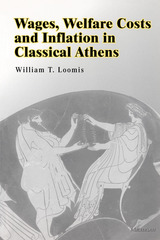2 books by Loomis, William T.

Harvard Studies in Classical Philology, Volume 106
Kathleen M. Coleman
Harvard University Press
This volume includes Natasha Bershadsky, “A Picnic, a Tomb, and a Crow: Hesiod’s Cult in the Works and Days”; Alexander Dale, “Sapphica”; Andrew Faulkner, “Fast, Famine, and Feast: Food for Thought in Callimachus’ Hymn to Demeter”; Guillermo Galán Vioque, “A New Manuscript of Classical Authors in Spain”; Jarrett T. Welsh, “The Dates of the Dramatists of the Fabula Togata”; Andrea Cucchiarelli, “Ivy and Laurel: Divine Models in Virgil’s Eclogues”; John Henkel, “Nighttime Labor: A Metapoetic Vignette Alluding to Aratus at Georgics 1.291–296”; Salvatore Monda, “The Coroebus Episode in Virgil’s Aeneid”; Mark Toher, “Herod’s Last Days”; Bart Huelsenbeck, “The Rhetorical Collection of the Elder Seneca: Textual Tradition and Traditional Text”; Robert Cowan, “Lucan’s Thunder-Box: Scatology, Epic, and Satire in Suetonius’ Vita Lucani”; Erin Sebo, “Symphosius 93.2: A New Interpretation”; Christopher P. Jones, “Imaginary Athletics in Two Followers of John Chrysostom”; and William T. Loomis and Stephen V. Tracy, “The Sterling Dow Archive: Publications, Unfinished Scholarly Work, and Epigraphical Squeezes.”
[more]

Wages, Welfare Costs and Inflation in Classical Athens
William T. Loomis
University of Michigan Press, 1999
William T. Loomis examines all surviving Athenian wages, salaries, welfare payments and other labor costs to determine what people really were paid for various kinds of work and allowances. These determinations, in turn, enable the author to cast a new and authoritative light on three controversial questions: Was there a "standard wage" in Athens? Were there periods of inflation and deflation? Did Athenians have an "embedded" or a "market" economy?
Individual chapters critically examine each surviving wage or other payment in thirteen job categories, including public office holders; soldiers and sailors; priests, oracles, and seers; overseers, architects, and other salaried construction personnel; and prostitutes and pimps. Three additional chapters then consider whether there was a "standard wage," inflation and deflation in Athens, and the implications of these conclusions for the hotly debated question about the nature of the Athenian economy.
This is the first comprehensive study of Athenian labor and welfare costs since August Böckh's Die Staatshaushaltung der Athener (1886). An updated critical study has been much needed, to take account of the greatly expanded evidence (Aristotle's Constitution of the Athenians, more than a dozen other papyrus texts and hundreds of inscriptions), and the uneven quality of the sources. This collection allows William T. Loomis to argue--contrary to prevailing scholarly opinion--that there never was a "standard wage" at Athens.
"This volume will be a significant contribution to all studies of ancient Greek civilization." --Alan L. Boegehold, Brown University
William Loomis is Visiting Professor of Classics, University of Michigan.
Individual chapters critically examine each surviving wage or other payment in thirteen job categories, including public office holders; soldiers and sailors; priests, oracles, and seers; overseers, architects, and other salaried construction personnel; and prostitutes and pimps. Three additional chapters then consider whether there was a "standard wage," inflation and deflation in Athens, and the implications of these conclusions for the hotly debated question about the nature of the Athenian economy.
This is the first comprehensive study of Athenian labor and welfare costs since August Böckh's Die Staatshaushaltung der Athener (1886). An updated critical study has been much needed, to take account of the greatly expanded evidence (Aristotle's Constitution of the Athenians, more than a dozen other papyrus texts and hundreds of inscriptions), and the uneven quality of the sources. This collection allows William T. Loomis to argue--contrary to prevailing scholarly opinion--that there never was a "standard wage" at Athens.
"This volume will be a significant contribution to all studies of ancient Greek civilization." --Alan L. Boegehold, Brown University
William Loomis is Visiting Professor of Classics, University of Michigan.
[more]
READERS
Browse our collection.
PUBLISHERS
See BiblioVault's publisher services.
STUDENT SERVICES
Files for college accessibility offices.
UChicago Accessibility Resources
home | accessibility | search | about | contact us
BiblioVault ® 2001 - 2024
The University of Chicago Press









